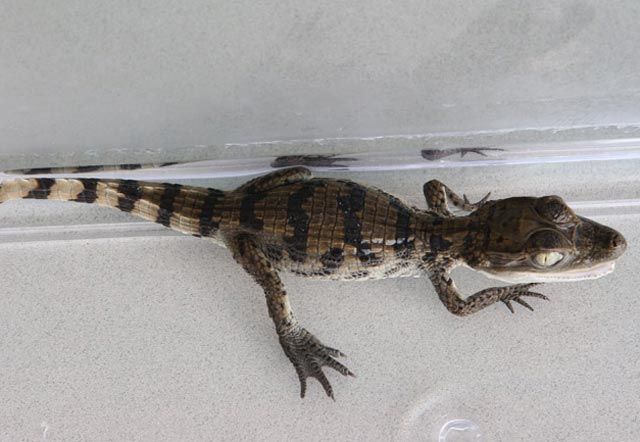Dubai: The illegally bought reptile from the Sharjah Animal and Bird market has been identified as a Nile crocodile, and it is most certainly to have a short life span if kept as a pet.
According to Dr Al Sayed Ahmad Ahmad Mohammad, Programme Director, International Fund for Animal Welfare in Dubai, Nile crocodiles are mostly smuggled from Egypt and Sudan for private ownership.
Crocodylus niloticus are listed by the Convention on International Trade in Endangered Species (CITES) in Appendix 1 which lists animals that are most endangered among CITES-listed animals and plants.
They are threatened with extinction and their international commercial trade is prohibited. The reptilian populations of Botswana, Ethiopia, Kenya, Madagascar, Malawi, Mozambique, Namibia, South Africa, Uganda and Tanzania are subject to an annual export quota of no more than 1,600.
Keeping a juvenile crocodile is like sentencing it to die, said Mohammad. "Nothing can compare to its natural habitat. It will not survive for long. It will suffer and die. Endangered species need to be in the wild. Buying it is akin to helping to take it to the brink of extinction."
The sale of wild and exotic animals is thriving in the illegal market. "There are laws in this country and they should be applied, but the Sharjah market needs more control. We need more monitoring," said Mohammad.
"I'm also 90 per cent sure this crocodile does not have the proper permits for export and import. The Ministry of Environment and Water will never issue a permit for these animals for commercial trade, it is not allowed and they are dangerous," he said.
UAE federal law 11 of 2002, article 26, states that anyone who imports species from Appendix 1 without proper permission is liable to imprisonment for up to six months and could face a penalty of up to Dh50,000.
"We need proper monitoring of local markets and traders. Inspectors should use this [federal ] article [26] and ask traders where the animals come from," said Mohammad.
Timeline: Illegal trade of wild, endangered animals
- 01/12/2009 Immigration inspectors at the Ras Al Darah Border checkpoint foil an attempt to smuggle 16 Houbara Bustards into the UAE
- 10/08/2009 Dubai Municipality confiscates piranhas being sold illegally in Dubai pet shops
- 1/08/2009 A 30cm-long baby crocodile spreads panic among passengers on board an EgyptAir flight from Cairo to Abu Dhabi
- 15/10/2008 Kangaroos and other endangered animals are found on sale at the Sharjah Bird and Animal Market
- 17/1/2007 Crocodiles measuring 30-50cm long can be easily purchased in Ras Al Khaimah pet shops, Gulf News reports
- 26/08/2006 Hyena cubs are found being traded illegally at the Sharjah animal market
- 10/08/2006 A Gulf News investigation finds 5 lion cubs and a cheetah being kept in a family flat in the northern emirates
- 16/11/2005 A former Dubai resident spots a tiger looking out of a Land Rover near Mall of the Emirates while holidaying in the city
- 14/06/2005 A woman is attacked by a four feet long python while watching a movie at a cinema in Dubai. She is rescued by another movie-goer who calmly unwraps the snake from her leg and takes it out of the cinema. Police hand over the snake to Dubai Municipality.
- 14/03/2004 A number of endangered wild animals are confiscated, which are illegally on sale from pet shops at Mina Zayed's Animal Souq, Abu Dhabi
- 25/09/2002 Six animals of an endangered species are confiscated at Dubai International Airport by authorities enforcing CITES (Convention on International Trade in Endangered Species of Wild Fauna and Flora)
- 30/04/2001 Kestrels and other endangered animals, which had been illegally brought into Dubai from Pakistan, are confiscated from smugglers at Dubai International Airport
- 31/03/2001 Visitors to the Global Village express anger and disappointment after witnessing the illegal sale of endangered animal skins, teeth and claws at the Sudanese Pavilion
In reality, the traders know where these crocodiles come from. Illegal poachers are known to collect crocodiles from depleting populations near Nasser Lake in Southern Egypt and sell them for Dh300 to Dh500.
"Smuggling is easy. At customs a random selection of people is checked, perhaps 5 per cent of passengers which means a smuggler will have a 95 per cent chance of success. This is very common," he said. "Even large cats are allowed for import, like a lion, but it is a dangerous animal and can make a big problem for anyone. Owners who are allowed to import these animals by the Ministry should be monitored a year later to check they still have it and it hasn't been sold on."
You can buy an Arabian Tahr
Several websites illegally selling endangered or wild animals out of the UAE are in operation. Some online portals even masquerade as official websites with logos or emblems from known municipal or ministerial authorities to fool potential buyers.
Watch video of the UAE's illegal animal trade
One such website Gulf News came across is selling the elusive Arabian Tahr for Dh40,000.
The long-haired wild goat-like animal is indigenous to the Hajar Mountains and is considered endangered. Also for sale is the Scimitar Horned Oryx which is extinct in the wild.










